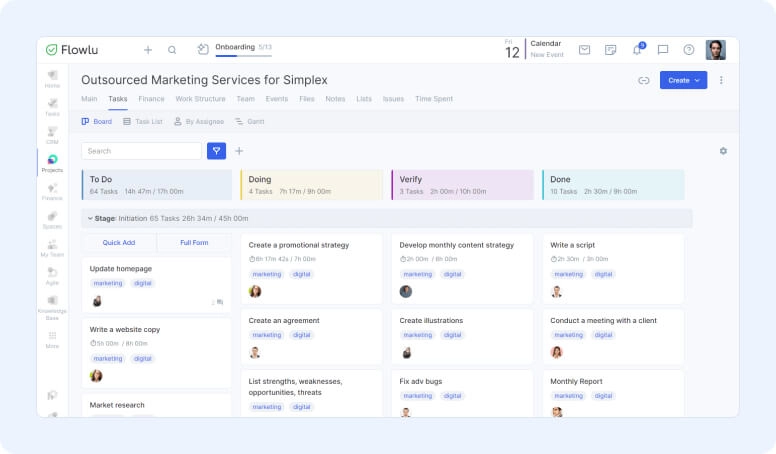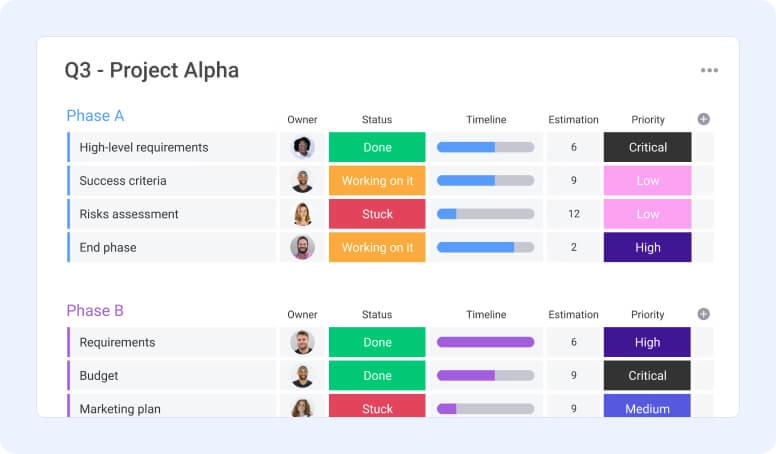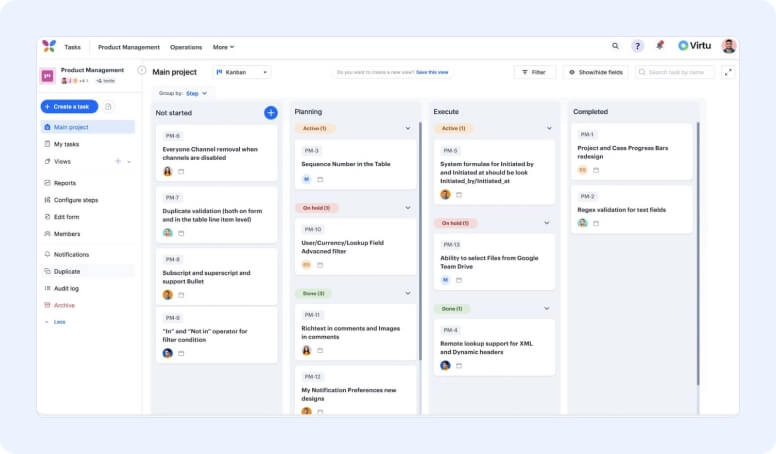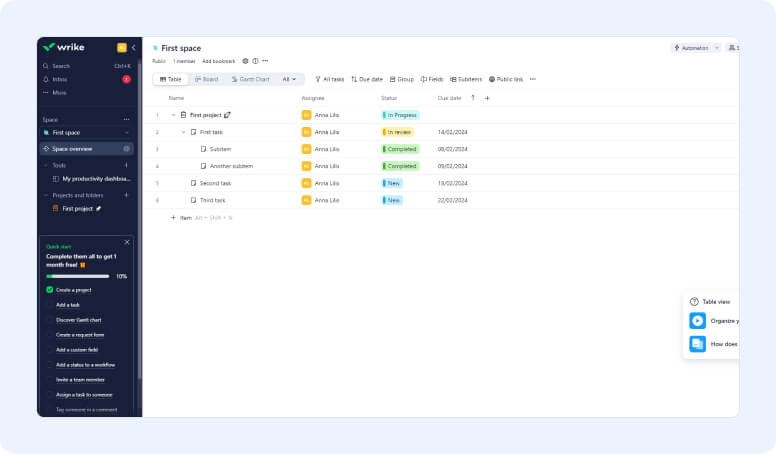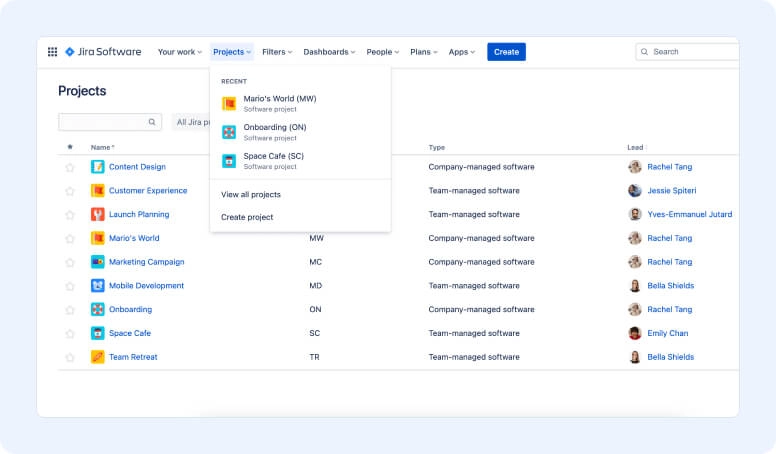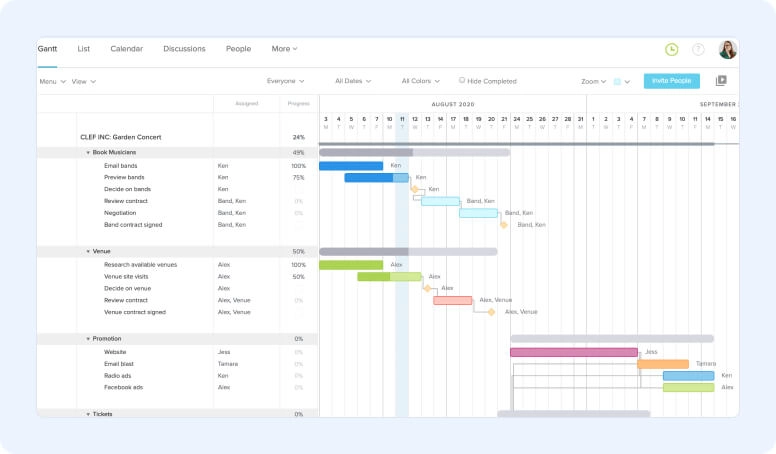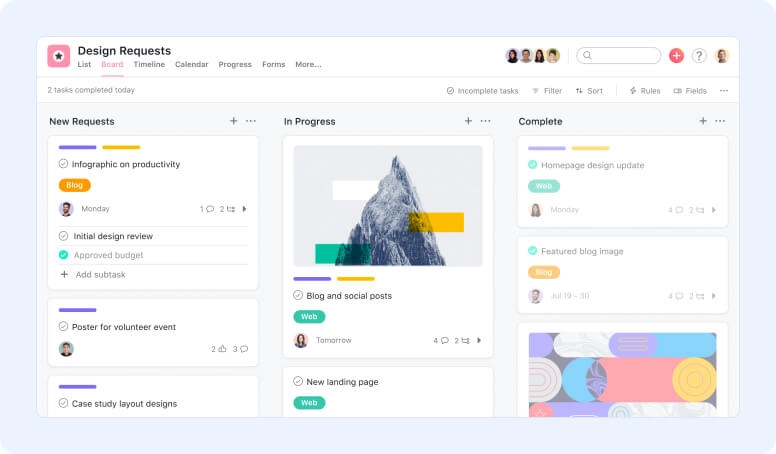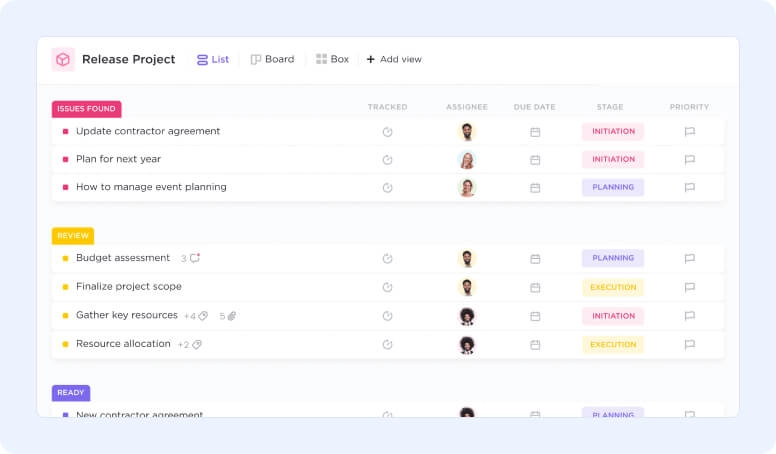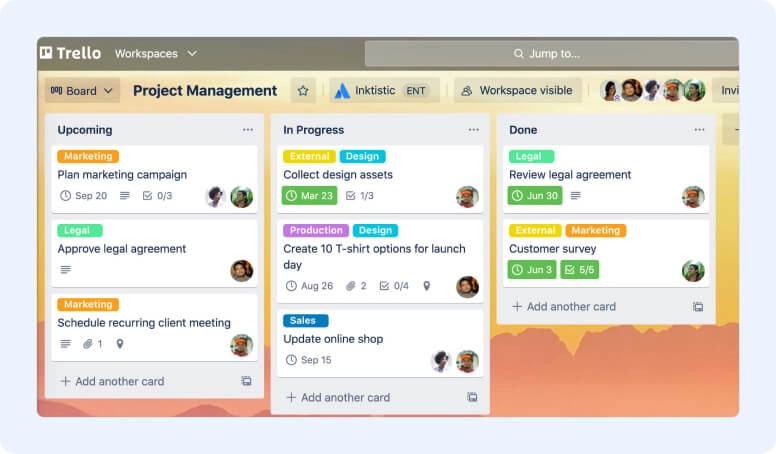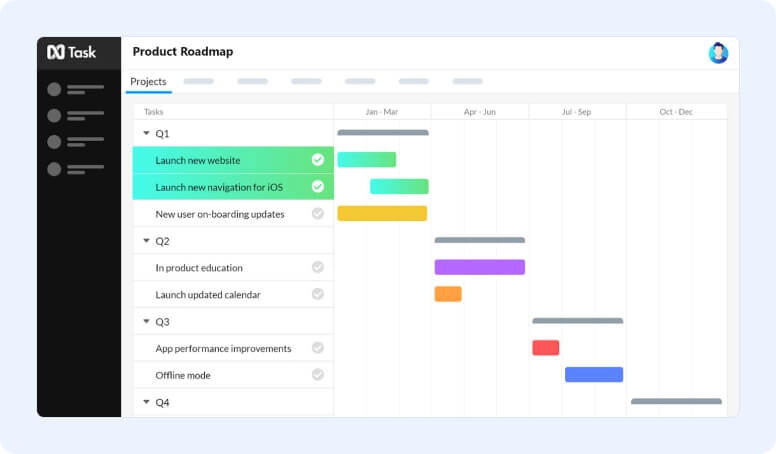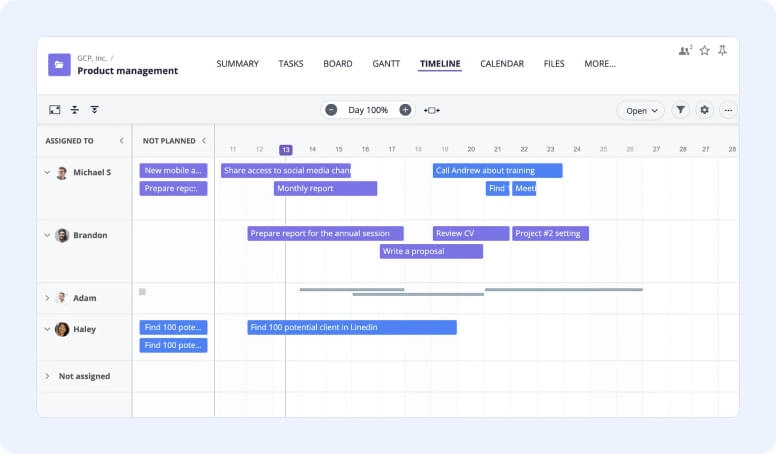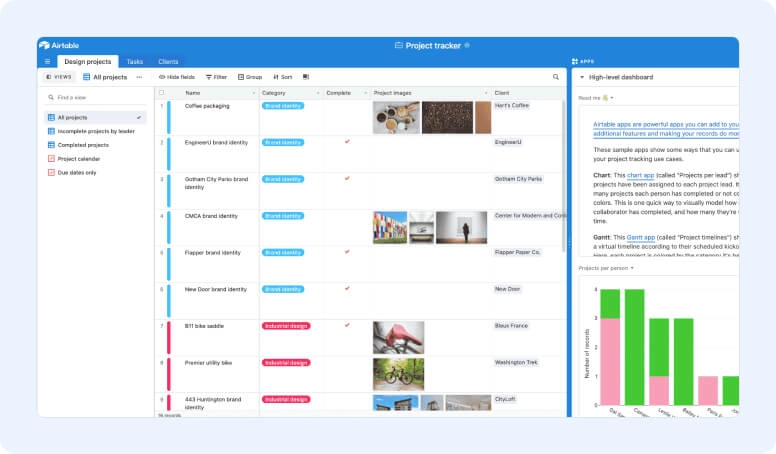12 Best Project Management Planner Apps For Your Business
To answer this question, we must first understand what components the leading project management planner apps need for us to consider them the best. Ease of use, kanban boards, Gantt charts, and basic tools like a space to make lists and a native calendar app are the types of features we would want to see. Plus more advanced tools for software development.
Our obsession with finding the best project management tools led us to doing some deep research, with the aim of finding the top services available. We’re pleased to report that we found 12 apps that all have features to improve the way your business approaches project management. And to help your business reach its objectives and goals, we’re going to share all 12 apps below.
What are the Best Project Management Planner Apps?
Below is a rundown of the apps we will cover in this article. Our selection is based on comprehensive research and real-world use of the products. We would never recommend a service we wouldn't use, and we’re confident there’s something for everyone, and none of the choices will disappoint.
- Flowlu
- Monday.com
- Kissflow
- Wrike
- Jira
- TeamGantt
- Asana
- ClickUp
- Trello
- nTask
- Goodday
- Notion
1. Flowlu
Flowlu cuts through the clutter of project management with a powerful suite of tools designed to keep your team focused and efficient. Unlike clunky software that weighs you down, Flowlu offers a user-friendly interface that makes even complex projects feel manageable. From brainstorming to invoicing, Flowlu keeps everything organized in one central hub, boosting productivity and reducing wasted time.
Flowlu offers a flexible approach to project management. No matter your workflow, Flowlu adapts. Choose between classic Kanban boards for a visual overview, mind maps to capture ideas, or task lists for a streamlined approach. Gantt charts provide a clear timeline, while time tracking ensures you stay on budget.
Collaboration is effortless with Flowlu. Share files, assign tasks, and keep everyone in the loop with built-in communication tools. Flowlu even integrates seamlessly with popular payment gateways, allowing you to generate and send invoices directly within projects. Integrated time tracking tools help you monitor the amount of time spent on each task, allowing for more accurate project timelines and better resource allocation.
Flowlu integrates with a variety of other tools and platforms, such as Google Drive, Mailchimp, Calendly, messengers and email services, ensuring seamless workflow integration. Track project budgets, expenses, and invoicing within the platform. Flowlu's financial tools help ensure that projects stay within budget and provide detailed financial reports.
Flowlu scales with your business needs. Whether you're a growing startup or a well-established company, Flowlu offers plans that cater to your team size and project complexity. With generous storage space for even the most document-heavy projects, Flowlu empowers teams to work together seamlessly, regardless of location.
2. Monday.com
Monday.com is one of the best project management apps because it found the perfect balance between form and function. Opting for a modern design, and using the app makes even the most tedious project management tasks feel fun to complete, something that’s sure to have a positive impact on your productivity.
The features available depend on the type of plan you use. For business use, it’s best to ignore the basic plan and go straight to either Standard or Pro. Both plans come with Gantt charts and Kanban boards, allowing you to choose your preferred view of your project mapping. You can also go ultrabasic and have a list view of your tasks and objectives, and input meetings into the native calendar.
Users can access up to 1TB of storage space, which is useful for large teams that share files and collaborate on variant document types. Also, it’s possible to divide projects into teams, and you can keep your project map private to each assigned team and its members, ideal for medium-sized businesses.
Our only criticism of monday.com is that the basic plan is so basic, that it’s not worth using. However, all the other plans offer exceptional value for money, and for those who want the best regardless of the price, monday.com is a sound investment to make.
3. Kissflow
Kissflow promises to improve project mapping and all-round workflows throughout your business. The good news is that, unlike many of the empty promises in the project management world, Kissflow actually backs up its promises through its exceptionally good software.
The app uses the popular drag-and-drop method with its project designer tool. Users can map out their projects from start to finish, and insert subtasks within their workflow. It’s possible to assign projects and tasks to multiple users, making it easier for everyone to know their role in the overall execution of the project.
Reducing the risk of human error, Kissflow is also packed with a wealth of automation tools that you can use to generate tasks such as document generation and sending comms on a time and date of your choice. From Google to Dropbox, there are also plenty of third party integrations available, allowing you to use your favorite apps, without having to leave Kissflow’s platform.
4. Wrike
Wrike’s core objective is to offer high-quality project management features so there’s no reason to use the other best project management planner apps available. The company is doing a stellar job too as the software is stacked full of features that work well and are simple to use.
As we’re aiming this article towards businesses looking for project management tools, we’ll focus on Wrike’s Business plan. This plan lets you develop your projects via lists, spreadsheets, kanban boards, and Gantt charts Each tool offers different views, allowing you to tailor your project planning to an aesthetic that suits your taste.
Wrike’s normal plans lack features such as reporting and analytical tools. It’s possible to add these features to your subscription through Wrike Add-ons. It’s also possible to connect over 400 cloud and on-premises apps using connected and accessible APIs.
5. Jira
Jira is one of the best project management planner apps for all types of users, but especially those using the agile framework. The software is full of tools that are ideal for long-term project planning and scrum and kanban boards are available to use, depending on which you prefer.
Putting much of its focus on agile project management, Jire suits businesses that specialize or are currently focusing on software development. Terminology like “epics' ' and “user stories' ' are embedded into its agile tools, making it easy for software developers to familiarize themselves with the product.
On top of its tools, 250GB of storage space is up for grabs, which should be more than enough for most users. The free plan –which is one of the best in the space -- offers 2GB of storage as well as some basic project management tools for task tracking, issue monitoring and task completion.
6. TeamGantt
Arguably the best project management planner app when it comes to Gantt charts, TeamGantt is a project management tool for those who aren’t fond of scrum and kanban boards, and may find standard lists too basic.
For some users, Gantt charts can feel overwhelming to develop. TeamGantt will remove any angst you may have as its design is easy to use and highly intuitive. Furthermore, the company has compiled a wealth of tutorial videos that are informative and simple to follow, so should you ever be stuck; you can easily become unstuck.
Inside the Gantt charts you can program how long a task within a project will take to complete, which tasks will run simultaneously, and which tasks you must hold until other work is finished. It’s a fantastic way of optimizing the timeline of your project and keeping clients or upper management in the loop of your progress.
7. Asana
If you don’t have a budget for the paid project management planner apps, Asana has an exceptionally good free plan. You can add as many teams as needed, as well as create as many project plans as you require. Each project, however, is limited to 15 users, so for large-scale projects that require several resources, you’ll likely need to upgrade your plan.
The main plus point we can give Asana is it’s designed in a way that makes it suitable for all levels of experience in the world of project management planner apps. The software is built heavily on traditional list and kanban methods of project planning, and there’s a dedicated “goals” feature so your business can identify and work towards milestones.
Reports are built into the app which allow you to track projects in real-time, and also allow users to monitor project budgets, KPIs, and incomplete tasks within your project. Asana isn’t the most affordable option, and there’s a large jump in cost between plans. However, we can’t deny that in return for your investment, you’re gaining access to a top product.
8. ClickUp
ClickUp is ideal for businesses on a tight budget. On top of its free plan, it also comes with super affordable paid plans. Don’t equate low cost to a decrease in quality and performance, as Clickup has several credentials that make it one of the best project management planner apps.
There’s a built-in “mind mapping” tool to help you think about and document all the potential steps needed to create your project. Multiple users can use the mind map tool making it excellent for collaboration. A timeline is available so you can track the progress of your project while understanding if and when it will reach completion.
Although there’s no shortage of features, some of them are a little slow in terms of responsiveness. It shouldn’t be a reason not to use the platform, but if you only want the quickest, most responsive app, Clickup isn’t that piece of software.
9. Trello
All the best project management planner apps excel in different ways, and Trello trumps them all when it comes to kanban boards. It’s best in that department and by some margin. Users can create multiple boards for different projects and develop completion timelines while measuring progress through dragging cards across the core steps of your project.
In terms of the Trello product, there’s not much more available than the kanban board style. Those looking for multiple views of their project should turn to our number one choice of the best project management planner apps, monday.com.
There are unlimited third party software integrations available, as well as some Trello-designed app integrations. Integrations can support software development, analysis, and reporting, while also offering project tools designed for specific departments that are common throughout businesses.
10. nTask
California-based software service nTask can boast that it offers one of the best project management planner apps around. Rather than offering a complex, overwhelming product, it has all the basic tools which it integrates into its software at a high standard.
nTask has features and terminology that make it ideal for agile project management and there's a decent kanban board available too. While the features perform well, they’re not as good as either Jira for agile software development or Trello for the kanban method. The Gantt chart is great and almost rivals those on TeamGantt.
The Business plan unlocks capabilities that are perfect for large-scale projects that involve multiple resources and departments. You can set specific tasks to staff members and program permissions to ensure you can segregate projects and steps, making them accessible only to the appropriate teams and users.
11. GoodDay
GoodDay is slowly working its way up the ranks of the best project manager planner apps in 2025. Not only is it loaded with the features you need to plan your projects, it also has a modern design that makes it a joy to use.
What we like about GoodDay is the number of project templates available. To help you save time, you can search through the plethora of template options and select the one that best suits the project you’re developing. Sorting your project goals and milestones is easy with Goodday’s hierarchy system and each user can separate their tasks from others with the “my work” feature.
While GoodDays free plan has many of the same features of the Professional plan, it doesn’t offer customer support. For business use, we’d recommend going with the Professional plan which offers 24/7 technical support, as well as one-to-one training, which you'll need as GoodDay isn’t the easiest tool to use if you’re a novice.
12. Airtable
Airtable isn't a feature-heavy app, especially when compared to some of the other project management planner apps in this article. However, it offers enough substance to help you improve your planning and workflow.
As well as the common project and task views, Airtable provides a spreadsheet view of your projects, something missing from the likes of Asana and monday.com. The app lets you manage multiple projects at once, while also placing them in order of priority. Reporting features are also present, as is the option to track how much time was spent on a task within your project.
Airtable’s limitations become apparent to anyone thinking long-term. There’s no integrated long-term planning app like the one found in Jira, nor can you assign specific tasks to different members of your team. Airtable is for basic, short-term project planning. If that’s not enough, then you should seek out one of the other options mentioned in this article.
Choosing the Best Project Management Planner Apps
After removing all the apps unworthy of your attention, we still appreciate selecting the best one from the 12 above may still feel like a large task. To help choose one of the best project management planner apps, it’s important the decision-makers in your business first ask the right questions.
What do you need your tool for? Do you prioritize functionality over modern design? Do you need advanced tools for software development? Also, the unavoidable question is, how much can your business afford to spend?
The good news is that several options above offer free trials, and they’ll also happily have a member of the team take you through the software with a free demo. It’s also a good idea to try out the free plans on offer. Although the free plans may not offer all the features you require, it’s a good way to gauge whether or not you enjoy using the platform.
Our Favorite Project Management Planner Apps
To give you some further guidance, allow us to use our experience to share what we believe are the ultimate project management planner apps. All of the above are sound options, but naturally, there’s always going to be the cream of the crop.
As mentioned, Flowlu is the very best of all the project management planner apps. It works incredibly well and should be simple enough to use for all levels of experience. It’s also secure as the company does its best to keep your data safe. On top of that, the pricing is fair, and although there are cheaper options on the market, they don’t offer the same quality.
For content creators–those who create articles or videos–Trello is the project management app you require. It’s simple to use and its kanban style makes listing content and the progress of its creation fun and interactive. It’s also good for those working in teams as it makes it straightforward to achieve fluid communication so you can all keep up to speed with progress.
Conclusion
Now that you know what the best project management planner apps are, and more importantly, exactly what they can do for you and your business, all that’s left to do is sign up for the software of your choice.
Remember, don’t rush into your decision, and open discussion between departments about wants and needs will help you choose the right service. Wherever you land, we’re confident all of the above options will help you develop your projects and execute them to the highest level of your capabilities.
Key features to look for include ease of use, Kanban boards, Gantt charts, task lists, native calendar apps, collaboration tools, time tracking, and integration with other platforms.
Yes, Asana and Flowlu both offer robust free plans that include essential project management tools, though they come with user and feature limitations.
Flowlu stands out due to its user-friendly interface, flexible project management options (Kanban, Gantt, mind maps), integrated time tracking, and seamless collaboration tools, along with strong integration capabilities with other platforms.









